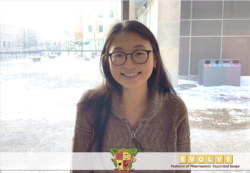Humans of Pharmacists’ Expanded Scope (HOPE) is a Humans of New York style photo campaign presented by the student run initiative EVOLVE. Its purpose is to interview pharmacy students, technicians, pharmacists, and other healthcare professionals to gain insight on their view of the expanded scope of pharmacy and where the role of the pharmacist in Ontario has the potential to go. New stories are also posted to EVOLVE’s Facebook and Instagram pages (@evolveuoft) so be sure to keep an eye out!
HOPE
Tina Nguyen (2T0)
As part of Pharmacist Awareness Month (PAM), I signed up for a pharmacy outreach day through CAPSI. We had the opportunity to go to a Shopper’s Drug Mart and educate patients there about blood pressure and diabetes. I enjoyed it because we were able to speak with patients and patrons of the store about our expanded scope. In the two hour period we were there, we took blood pressures and answered any questions that people had for us as they walked by. It’s exciting to see pharmacy move in this direction where we increasingly get to educate patients on their conditions. Clinic days like these are a great way to showcase our therapeutic knowledge.
Angela Chen (2T1)
With the recent legalization of cannabis - what roles do you think pharmacists have to ensure safe cannabis usage in patients? Cannabis use could definitely be part of the information that pharmacists gather along with smoking history and alcohol. With legalization, patients would feel more comfortable opening up about their cannabis use, and naturally they might wonder if it is safe with their medications. Pharmacists could try to be prepared for patient education, though it would also be a difficult task given that current research on recreational use is very limited.
Shreeya Thakrar (2T1)
What made you want to become a pharmacist? In grade 12, I was doing well in all of my science classes and at that point if you were good at science you were to pushed to be a doctor, so I applied and got into life science at Queens. I had my eyes set on life sciences because that’s typically premed. In my mind, my career options were medicine or research. I wanted to do something patient centered and so for my first 2 years of undergrad, I was very med geared because all of my peers wanted to do it. It was what I was surrounded by and there were not many opportunities to do anything else. Simultaneously, while studying for the MCAT, I got a position at the SickKid’s pharmacy and that’s when I realized I wanted to switch paths. I got to see a side of pharmacy that I didn’t know existed. A lot of my family friends that were in pharmacy school all went overseas because they couldn’t get in [in Canada] and there were issues like job saturation and loss in wages so people were pushing me to medical school and away from pharmacy. I was hesitant and wanted to experience pharmacy myself before deciding. I asked to volunteer at a community pharmacy and it was the easiest decision I ever made, to switch career paths. We don’t just dispense, which is something I thought before these 2 experiences. So then I decided to go into pharmacy by writing PCAT and telling my entire extended family to switch. The questions started to roll in, constantly defending my career choice but because I had such great experiences, I was able to be confident. It made me even more passionate to advocate for pharmacy even more, especially how receptive people were once they understood our expanded scope, etc. The fact that people don’t know about our role is concerning. The public opinion needs to change before we get the same platform as doctors. We’re in healthcare and helping people just the same, although our scope is different but that’s any profession. It’s surprising to see how much public opinion differs compared to careers like medicine.
Andrew Tu (2T2)
What is an expanded scope service you would like to see pharmacists practice in the future? I would like to see the scope of pharmacists expand to include prescribing authority for medications involved in treating minor ailments like allergies, or cold and flu symptoms. I think this would improve patient accessibility and reduce the wait times experienced at physician offices. After all, pharmacists are medication experts!
Sandra Chan (2T0)
Most of my experiences with pharmacists have been on a preceptor/student level, however one story I’d like to share is with my mom. She was diagnosed with breast cancer a couple years ago, she’s happily in remission now but she was taking tamoxifen for 5 years and towards the end of the 5-year course, the doctor recommended she should take it for another 5 years. However, my mom doesn’t like taking medication and having to take the medications for another 5 years served as a reminder that she was sick. She was not convinced when I tried to talk to her about it. When she went to her pharmacy to pick up her medication, she decided to ask the pharmacist for their opinion. They took her aside and explained the research and the trials behind the doctor’s recommendation and why they recommended taking it for a total of 10 years instead of 5. Although she wasn’t convinced right there and then, she really appreciated that the pharmacist took the time out to talk to her about her options.
Tara Hosseinnejad (2T0)
1. What do you think the biggest challenges are facing pharmacy? Work force issues, in other words, pharmacist have too many tasks and targets that prevents them from undertaking clinical work. In an average sized community pharmacy, the pharmacist is not only doing technical check, clinical check of a prescription/he she is responsible for counseling, conducting MedsChecks and checking inventory. In this case, the pharmacist does not have enough time to conduct a complete patient history for use of expanded scope such as Rx adaptation and renewal. Pharmacists should delegate tasks in the light of new roles and responsibilities. Also, new pharmacy models should be developed to account for these changes 2. What are some ways that you think pharmacists can do to provide better care to you? We are at a critical time for pharmacy where our practice is shifting from traditional dispensing to providing professional services in an integrated health care model. Pharmacists have expanded scope of practice. However, many of them are not comfortable to use this expanded scope. I think the most critical thing for pharmacists is to be confident in their knowledge and utilize the expanded scope. The older generation pharmacists are more hesitant to adopt/renew prescriptions, administering vaccines but the new generation is more confident and this is where pharmacy is heading. Hopefully in future pharmacists in Ontario will be able to utilize more of their knowledge through activities such as prescribing, ordering lab tests and caring for chronic conditions.
Mohit Gill (2T2)
What positive experiences/stories have you had with a pharmacist: During my last year of undergrad, I got the opportunity to work in an independent community pharmacy in Toronto. Initially I didn’t think much of it. I’d get to learn about drugs, learn how to process prescriptions and learn the daily lifestyle of a pharmacist. While working every weekend, I started to see a pattern. A large fraction of the patients who would visit the pharmacy were not only of a close diameter from the pharmacy. Families from different parts of the GTA would come to this specific location and had been doing so for many years. It was hard to believe that this specific pharmacy was able to provide exceptional clinical care of a higher standard compared to other pharmacies in the GTA. Then it hit me, it was their experience. It was the sense of community. Patients would come into the pharmacy not only to discuss their medications, but also to have a casual chat with the pharmacist. Pharmacy practice is so much more than dispensing medication and counselling. Patients want to be understood and appreciated and as healthcare professionals we have the responsibility to do exactly that.
Aaron Tran (2T2)
What positive experiences/stories have you had with a pharmacist: When I worked as a pharmacy assistant, the pharmacy I worked at had a lot of prescriptions for opioids and narcotics. There was a day where a patient came in to fill their prescription for Tylenol 3 and unfortunately, they did not have any more refills. The pharmacist/ pharmacy manager instructed me to call and fax the doctor while he consulted the patient and explained the situation, ensuring the patient that the pharmacy will contact her as soon as possible. The scene escalated when it came to 5 o’clock and the doctor’s office had closed and the patient urged that she was in a lot of pain. This is where I witnessed the pharmacist reassure the patient by explaining that the staff at the pharmacy are trying their best to get her prescription from the doctor and were doing as much as they can within the scope of practice. The pharmacist even offered to call an ambulance as the patient appeared to be in a lot of pain, but explained they were unable to go to the hospital because she is unable to find someone to watch her kids. Unfortunately, the patient did not fill their prescription that day, but the pharmacist kept note on the patient’s prescription and promised to call the patient when the fax was received, which came the next morning. This experience made me realize the importance of accountability and professionalism, but also looking forward to the future of pharmacy and how it could have changed this situation.











